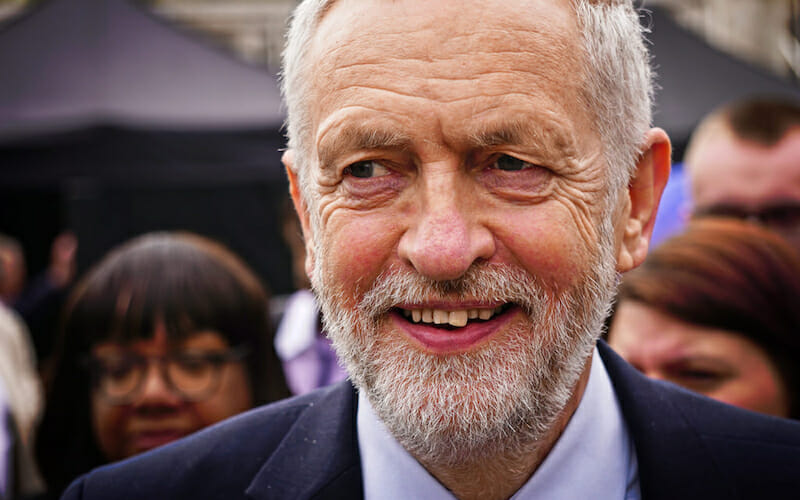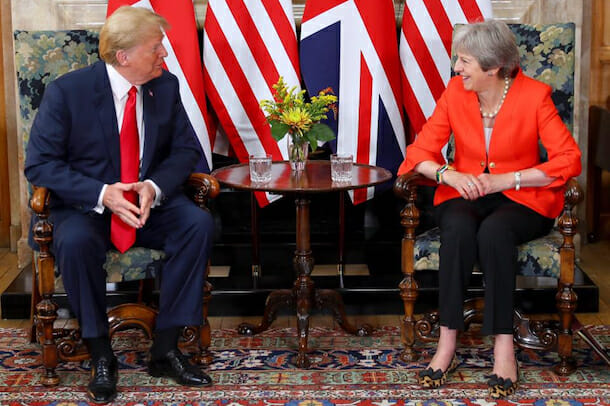
The Rising Vision of Labour
Politically speaking there was nothing particularly special about Tuesday July 24th. But, for multiple reasons, it felt different. Jeremy Corbyn delivered a speech called “Build it Britain,” which among other things set out a plan for restoring a strong manufacturing base to the UK. It included plans for a “Labour Brexit.” The day before, Prime Minister Theresa May had been in the Northeast of England to set out her vision for Brexit.
Throughout the day there were news stories detailing the instability of the country. Last year saw the largest rise in poverty since Thatcher. Brexit Secretary Dominic Raab created the term “adequate food supply” when discussing a no-deal departure from the EU. And May said she, not he, would lead future Brexit negotiations. The speeches, the fact checking, slip-ups and embarrassments almost felt like an election was approaching.
The current PM toured the country, looking frosty faced with real people, while the leader of the Labour party looked relaxed in comparison. Theresa May tried to be personal, human, but failed miserably because she doesn’t mean what she says. Asked what she enjoys doing in her spare time, May responded with “I enjoy cooking, which has a benefit, you get to eat it as well as make it.” In my mind it provided the perfect setup for Jeremy Corbyn, who bemoaned the fact that contracts to build naval ships are going abroad. If this country needs naval ships, why don’t we get the benefit of the jobs to make them as well?
This year, the ideas are all one-sided. I don’t know what Theresa May even really stands for. When writing about Theresa May it’s vital to really only talk about her frightful situation, her political enemies on both sides of the House, and her incredible lack of chat. One unnamed former colleague in one of the pieces kills her with praise: “She sits, you talk. She looks at you, and then you leave.” Who needs enemies?
I don’t get any sense that Theresa May is a thinking politician. If she made up for this by being a charismatic politician, that would be fine. All I remember is the clip of her in the Northeast telling how she unwinds from the “world’s most stressful job” with her 150 cookbooks. A recipe for disaster, more like. Nobody sat in her cabinet now are thinkers either.
Her reshuffle earlier this year almost looked as though it would stir up something exciting: despite the increase in the proportion of Oxbridge-educated and senior ministers, May insisted her government looked “more like the country it serves” after axing a number of white men in their 50s and 60s and promoting younger, female and minority ethnic MPs. The Daily Mail called it a “MASSACRE OF MIDDLE-AGED MEN.” When May’s spokesman was recently asked why her reshuffle only promoted white, middle-aged men, reversing the January move, they replied that the prime minister wanted “the right people for the right jobs.”
But rather than being the right people, they look like the bored people. For such a split party, the Conservatives don’t even look awake enough to fight properly anymore. Say what you will about Boris Johnson and Andrea Leadsom, at least they could ruffle feathers. On Tuesday, the latter visited a chocolate factory in York, appearing positively insensate. The political anorak in me sometimes even prays for more Nadine Dorries. Instead we have Transport Secretary Chris Grayling who when asked whether he’d be accountable for the timetabling “fiasco” of the InterCity East Coast rail franchise, responded by saying he was not “a specialist in rail matters.”
I see a party worn down and moth-eaten. From top to bottom nobody gives a damn. Gone are the days of 2010, when Tory think tanks fizzed with ideas about spreading asset wealth among the poor, about the “mutual moment,” and a new wave of community-based financial providers. Even, dare I say it, a Big Society. 10 years ago, the strategist closest to the Tory PM talked about the need to underwrite new models of ownership away from pure market-based solutions because “the richest 1% own as much in property, pensions and financial assets as the poorest 55%.” The thinkers of May’s Tory party have left the building. In so far as we can label them as such, Nick Timothy and Fiona Hill have scarpered. Who is now to Theresa May what Philip Blond was to David Cameron? Where is the intellectual mood music for that party, because my goodness it is needed.
In a New Yorker piece, a bittersweet detail describes the problem we face in the UK, where an EU no-deal looks not implausible, with dullards on either side of the negotiations causing delays as the leave date fast approaches, followed by Theresa May’s definition of politics: “Between 2016 and 2018, the U.K. went from being the fastest-growing major economy in the world to the slowest, as businesses halted investment plans, migration dwindled, and foreboding filled the air. The government’s own estimates show that every form of Brexit will make people worse off, ranging from a relatively modest impact, if the country ends up somehow entwined in the E.U. — and thereby less free — to a cost of around 8% of G.D.P., if it leaves with no formal deal at all.”
Tomorrow’s front page: Donald Trump @realDonaldTrump accuses the PM of wrecking Brexit – and warns she may have killed off any chance of a vital US trade deal – full story HERE at 11pm https://t.co/JRrMjQDTBq pic.twitter.com/udCjYWQeeQ
— The Sun (@TheSun) July 12, 2018
According to the Resolution Foundation, last year inflation rose above 3% and the official poverty rate — 60% of median income including housing costs — rose from 22.1% to 23.2%, the biggest single year jump since 1988. The Tories’ drive to eradicate the deficit and punish normal families for the financial crisis causing the value of tax credits, child benefits, and housing benefits to remain frozen since 2015. The child poverty rate rose in 2017–18 from 30.3% to 33.4%. The rate has also been rising since 2011 — under the Conservatives. During the last Labour government, child poverty fell from more than 3 million to around 1.6 million, meaning that rather than missing the set target by 600,000, as originally thought, Labour more than met it. Someone tell Iain Duncan Smith — who at the time used this missed target to change the method of reducing child poverty by focusing on welfare dependency, addiction, educational failure, and family breakdown.
One way to get Britain out of this malaise is for the country to earn more and sell more. In order to do so, the UK needs to be more productive. And to be more productive, we need the right jobs and industries across the country. To secure this we need to rebalance the economy away from London and away from a single dominant industry. We know that between the years 1970-2007 the finance sector, heavily concentrated in the capital, grew from 5% to 15% of total economic output while manufacturing decreased from 32% to 12%.
Whether by design or with an invisible hand, the way our economy is run has created a shambolic mess through which inequality has been allowed to blossom. As Larry Elliot said on Tuesday: “Britain’s growth model — flexible labour markets, a laissez-faire takeover code, debt-fuelled consumer spending and an indifference to the fate of manufacturing — is broken. Living standards have flat lined. Wages have grown in the past decade at their slowest rate in 200 years. Productivity has stalled. The ready availability of cheap labour has meant there is little incentive for firms to invest in new capital or staff training. As the CBI has reported, the lack of investment means that British industry runs into supply bottlenecks as soon as there is a modest pick-up in demand.”
It’s not a good time to have a tired, clueless, intellectually unstimulated Prime Minister and cabinet colleagues in a party condemned to the same. The socio-economic models that have governed this country have come to their end, but our political class are so bereft of ingenuity that the model remains, festering, swarming with flies. On the other hand, the opposition does not look bereft of ideas to tackle this situation. In fact, the Labour Left at the moment — a hair’s breadth away from entering Number 10 and forming the next Government — looks positively bursting with ideas on how to deal effectively with the current socio-economic mess this country is in. Constructive reasons for building up manufacturing jobs instead of reliance on the finance sector permeated Jeremy Corbyn’s speech on Tuesday. But it doesn’t stop there. Ideas on how to actually create that change, unchaining and unbundling our economy from a “dysfunctional, over-exposed financial system,” make up part of the economic strategy of Corbyn’s inner circle, particularly James Meadway, economic advisor to John McDonnell the shadow chancellor, whose paper ‘Why We Need a New Macro-Economic Strategy’ posits those ideas.

These aren’t just empty words to throw out there as sops to building a “Northern Powerhouse.” Corbyn’s team are thinking through what the problems are and the practical legwork needed to roadmap a solution. On Tuesday, a big analysis of “The Corbyn Project” was published from Robin Blackburn, an historian and professor at Essex University, wherein he describes the political project as one premised on actually felt inequality and social elitism. The Corbyn project is not trying to force a story about UK capitalism that we know the British public are reluctant to hear. It is about showing how our national economic policy — mercantilism — are engineered to rip us off.
Rent-seeking behaviour in key utilities means we don’t reap the benefits of our national produce.
One example is about privatised water and sewage companies, which at the moment are owned by overseas companies. It’s estimated that the cost to those companies for shareholder dividends and debt interest is £2.3 billion each year, a cost that would disappear if the investment in those companies could be swapped to public debt. Because the companies are profitable, it would result in positive investment for taxpayers, since the profits on that asset will cover the borrowing costs of buying it. The case for nationalizing a key utility is explained in the interest of the public and taxpayers, but also with traditional business nous. It’s not a calculated punishment set on companies, but a realization that the public doesn’t benefit from the spoils of profitable utilities.
As opposed to Left thinking of old, Corbyn is clearly making positive sounds about bridging divides between the trades union movements and the environmentalists — or in other words, healing potential tensions between a purely-jobs focus and a low-carbon economy. In his speech on Tuesday Corbyn, as well as highlighting the investment in zero carbon homes, explicitly stated that: “Firms our government does business with will have to: properly pay their taxes, respect workers’ rights, provide equal opportunities, protect the environment, train their workers, pay their suppliers on time and end boardroom excess by moving to a 20–1 limit on the gap between the lowest and highest paid.”
Another key thing is the temperament of Corbyn’s message: keeping public utilities profitable and turning that into a public benefit, rather than money for nothing for a company’s shareholders, can be as palatable for centre-leftists as is it for any politics promoting equity for taxpaying UK citizens, and fiscal responsibility. As Blackburn puts it, these policies are not anti-capitalist, but: “They challenge poverty, inequality and commodification. They enhance popular resistance to, and potential control over, the accumulation process. They promote democracy and popular superintendence of the social surplus and how it is invested.” As Blackburn also points out, one major difference between Corbyn’s team and May’s is that Corbyn’s can lean on a range of very interesting, newly enthused think tanks, from the New Economics Foundation (NEF) to the IPPR, the Smith Institute to the Centre for Labour and Social Studies (CLASS), and beyond.
There’s a reason the hubs for left-wing ideas feel a certain enthusiasm, and that’s because power is in sight. Maintaining good relationships with organisations that take a ‘critical friend’ approach, as well as unconditional support, is important too — the onus of which is on Corbyn’s team…Pragmatism not insularity.
We’re currently witnessing a societal and economic hurricane. The Conservatives look as tired as the hot and bothered commuters currently on after-work trains. Brexit is being mishandled for sure, but so too is everything else from rebalancing the economy, raising necessary productivity levels, reducing poverty, and quashing inequality. This government is devoid of the good ideas and a roadmap to significant change needed to save our bacon. Not true of Labour, who I think are genuinely looking like a government in waiting.

